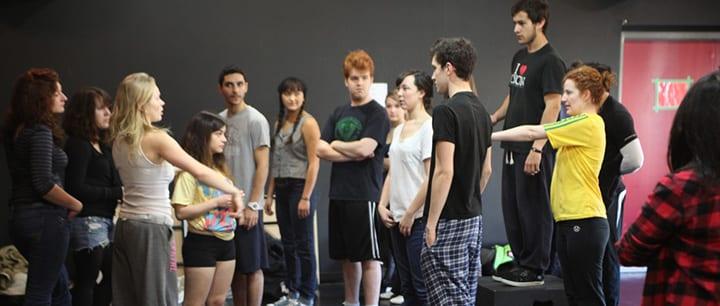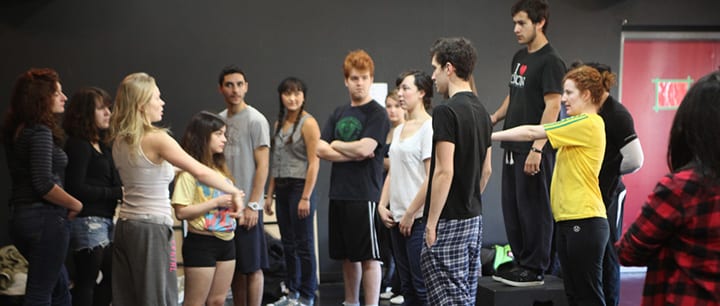Are you dreaming of a career on stage or screen, and wondering how to develop the most important skills for actors? In this article, we’ll outline 10 acting exercises that will get you primed for performance, as well as outlining what to expect from your first acting lesson.
| Acting Exercise | Purpose |
| Deep Breathing | Warming up before rehearsals, auditions and performances |
| Yoga | Strength and physicality training, character development |
| Close Reading | Audition and performance preparation |
| Memorization | Audition, rehearsal, and performance preparation |
| Watching Other Actors | Learning about the craft and understanding the industry |
| Making Choices | Trusting your instinct, character development |
| Self Tape | Developing your craft |
| Introspection | Acting skills, emotional development, character development |
| Letting Go | Industry training, professional development |
| People Watch | Character development |
What Are the Best Acting Exercises?
The best acting exercises include deep breathing, yoga, close reading, memorization, watching other actors, making choices, self taping, introspection, letting go, and people watching. There are so many different techniques and options out there, but the best theater exercises are those that help you rise above your challenges, develop essential skills for actors, and get to the next level in your craft. Whether you’re just getting into acting, or you’re a veteran performer, the following exercises will help you become the best performer possible.
1. Deep Breathing
Deep breathing will take a bit more concentration at first. As you breathe you have to focus on sending the air into your belly. This will cause your diaphragm to pull more air into the lungs than it normally does. When done right, the belly will expand, then the chest, and finally the shoulders will roll back and you will stand up a little straighter. Slowly let the air out and start over.
2. Yoga
Yoga is the backbone of most acting skills: Movement classes because it connects your breath to your body. Start is a few basic poses that flow well together. They are designed for you to “find” the pose, meaning do the pose correctly while breathing and not falling over, and hold it. At first hold each pose you choose for about three (3) seconds.
3. Close Reading
Actors must read, understand, and interpret very quickly. In some cases an actor has to do all those things and perform, all at the same time! Actors must learn to pull every bit of information from a text on the first read. To do that, you have to read something and see how much information you get. Read something, then again, but this time looking for things you missed. Try it with something new.
4. Memorize
Once you have read a thing, memorize a piece of it. Memorization is one of those essential skills for actors. And it’s just like any other acting skill: it must be built and used or it goes away. Find something you are interested in and haven’t memorized, then memorize it. Then find something you aren’t interested in and memorize that. Over time, memorizing will get easier. If you are having trouble memorizing at first, there are strategies to help.
5. People Watch
Actors ask questions about what people are really like. To do that, go to where people are and watch them. Make sure that you are safe in these places. Once you are around people, make up stories about who they are when they are not at the place where you are. Use the way they walk and the way they are dressed to help you create the characters and the lives they lead.
6. Make Choices
Actors make choices as they perform. The best way to get better at making actor choices, is to do it. Find a script to work on, and make some choices about the characters. Find a book and create a detail that wasn’t given to you by the author. The more choices you make, the easier they become. Creative choices can come from anywhere. The trick is being open to them and trusting them.
7. Watch Other Actors
Every serious artist pays attention to the artists around them. Serious actors need to watch other actors. Find the things you liked and didn’t like about their work. Keep the things you liked and avoid what you didn’t. It’s helpful to figure out why you liked and didn’t like things. Watching other actors not only allows you to learn from watching their craft, but it supports them so the artform can stay alive.
8. Self Tape
Self taping is the most unnerving acting exercise. You have to prepare a piece, film yourself performing it, then watch it and critique your performance. The hard part is being fair to yourself. People are, generally, their own worst critics. This is not about seeing how good or bad you are. This process is about finding ways to improve. Be kind to yourself. Beating yourself up for your performance only hurts you.
9. Introspection
Introspection is the process of looking at how you are feeling at any given time. This is probably one of the most important skills for actors to develop. You have to analyze your feelings, learn where they came from and why they happened. All of these answers have to come from within you. No one made you feel anything. They might have done something to prompt those feelings, but they are your feelings, own them.
10. Letting Go
Letting go is very hard for most people to do. It is also a vital part of performance. When things go wrong, and they will, you have to try yourself to not let it bother you. Bad things happen all the time in this business. People forget lines, and miss entrances. They happen. The show must go on. Let it go. Move on to the next performance, because you can’t change the past.
What Can I Expect at My First Acting Lesson?
While some celebrities have had incredible luck with “being discovered,” the vast majority of talented actors and actresses have extensive training, which means many hours and years dedicated to theater exercises like those above, whether attending one of the top acting schools or conservatories, or in private lessons.
What can you expect at the first lesson? You may have had a small role in the ensemble of a high school musical or community theater production. You may have zero experience whatsoever. Either way, it’s okay to be nervous. Regardless of the specific technique, acting is all about accessing different human emotions and relating to others based on shared experience. An actor is constantly putting themselves in vulnerable situations for an entire audience to see. Tap into that raw sensation and embrace it! Here are some things to expect:
Stretching & Physical Warm Ups
An actor’s major tool is the body, and anyone interested in getting into acting will need to have complete control over everything their voice and body does. To do that, most lessons typically begin with physical theater exercises of some sort. You may spend some time working on breathing, such as how to properly take in a large quantity of air and use it to its fullest potential. This will aid in reducing anxiety and improving the quality of your speaking voice, which is vital in both stage and screen acting.
Next, you most likely will continue with a few minutes of stretching to loosen up your muscles. Since almost all plays, musicals, movies, and TV shows (unless you are playing a character in a coma on a soap opera) require movement, you have to be very aware of how your body works. Leg stretches, shoulder rolls, and maybe even some jumping jacks to get the blood flowing will make an appearance. The goal is to eliminate any tension your body is holding onto as much as possible. Doing so will allow you to easily engage when on stage.
Theater Games
Now, we enter into the more “awkward” aspects of a lesson: preparation exercises and improvisation. Acting exercises and theater games such as “zip zap zop” keep actors (in a group setting) on their toes as they have to maintain their focus and attention. While the activity may seem ridiculous at first (shouting nonsense words while making unusual gestures), this leads you to develop basic acting skills such as the famous “living in the moment.”
Additionally, improv games (anything from “Whose Line Is It Anyway”) will keep you on your toes as you further fine-tune important skills like paying attention, maintaining eye contact, and working together while you start to develop and craft characters, however profound they may or may not be.
Scenes, Monologues, & Performances
Eventually, the more lessons you attend and the more advanced you become, you will tackle monologues, scenes, and perhaps even put on a full-length performance to help gain experience on your quest of getting into acting. Depending on your level and particular needs, you may venture into audition preparation and go over ways to carry yourself and present a headshot, in addition to nailing cold readings. The best teacher is real-world experience, and acting lessons will provide you with what you need to make the most out of those experiences!
These Theater Exercises Will Prepare You for Success
While the games and tasks outlined above may seem like something only a beginner would take on, the truth is that all great theater professionals use acting exercises. They can be used as warm ups before a show, prep for auditions, or even as a bonding activity for the cast of a play. Each of these is an important way of developing skills for actors. Whatever your level or goals, these theater exercises will set you up for success,
 Matthew H. teaches a variety of subjects both online and in New Milford, NJ. He recently received his MA from NYU with a background in Sociolinguistics and related research. Learn more about Matthew here!
Matthew H. teaches a variety of subjects both online and in New Milford, NJ. He recently received his MA from NYU with a background in Sociolinguistics and related research. Learn more about Matthew here!
 Photo by vancouverfilmschool
Photo by vancouverfilmschool
Suzy S.

